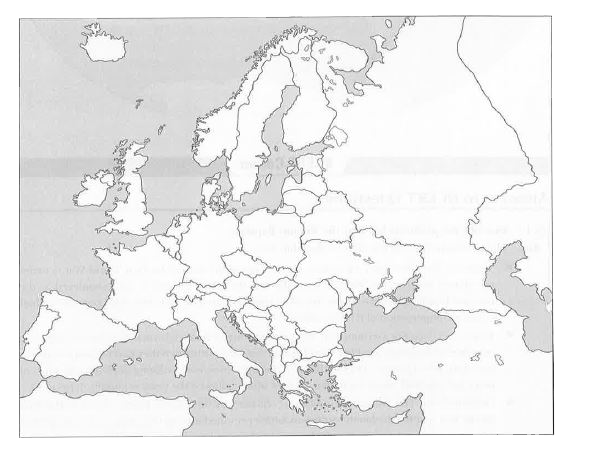Explain the contribution of Otto von Bismarck in German unification. (2011 D)(3 marks)
Otto Von Bismarck was the Prussian Chancellor. His main goal was to further strengthen the position of Prussia in Europe. Bismarck had a number of primary aims:
(i) To unify the north German states under Prussian control.
(ii) To weaken Prussia's main rival, Austria, by removing it from the German Federation.
(iii) To make Berlin, not Vienna, the centre of German affairs.
(iv) To strengthen the position of the King of Prussia, Wilhelm I, countering the demands for reform from the Liberals in the Prussian Reichstag.
Similar Questions
Knowledge Check
Name the famous hall when Otto von Bismarck gathered to proclaim the German Empire headed by Kaiser William?
AThe Hall of Mirrors in the Palace of VersaillesBThe Wall of Horrors in the Palace of VersaillesCThe Hall of Mirrors in the Palace of MinceDThe Hall of Terrors in the Palace of VersaillesRead the source given below and answer the questions that follows:
In the, German regions, a large number of political associations whose members were middle-class professionals, businessmen and prosperous artisans, came together in the city of Frankfurt and decided to vote for an all-German National Assembly. On 18 May 1848μ1831 elected representatives marched in a-festive. Procession to take their places in the Frankfurt Parliament convened in the Church of St Paul. They drafted a constitution for a German nation to be headed by a monarchy subject to a parliament. When the deputies offered the crown on these terms to Friedrich Wilhelm IV, King of Prussia, he rejected it and joined other monarchs to'oppose the elected assembly. While the opposition of the aristocracy and military became stronger, the social basis of parliament eroded. The Parliament was dominated by the middle classes who resisted the demands of workers and artisans and consequently lost their support. In the end, troops were called in and the assembly was forced to disband.
The issue of extending political rights to women was a controversial one within the liberal movement, in which large numbers of women had participated actively over the years. Women had formed their own political associations, founded newspapers and taken part in political meetings and demonstrations. Despite this, they were denied suffrage rights during the election of the Assembly. When the Frankfurt Parliament convened in the Church of St Paul, women were admitted only as observers to stand in the visitors' gallery. Answer the following MCQs by choosing the most appropriate option.
Otto von Bismarcks' contribution in building nation of Germany is remarkable. Who was he?AThe King of PrussiaBThe Prime Minister of PrussiaCThe President of PrussiaDThe Chief Minister of PrussiaThere are 6 persons in a list A, B, C, D, E and F. They got different marks in an examination. C got more marks than D but less than B. E got more marks than F and F got the least marks among them. The one who got the highest marks got 400 marks and the one who got the least marks got 60 marks. The one who got the highest marks, his position in the list is number 1 and the one who got the least marks, his position in the list is number 6.
If A got 400 marks and E’s position in the list is 2nd last and the persons who got last 3 positions in the list, their average marks is 95, then what will be the total marks of D and E together?A245B235C225D200
Explain the structure of methane.Give an example of a molecule exhibiting sp3d2 hybridisation. How is it possible for d-orbitals to mix with lower energy s and p orbitals?
View SolutionSome of the sentence are grammatically correct and some are incorrect. Find which part of the sentence has an error and mark that part. If there is no error, mark that part as your answer
A major contribution of Mathura sculptorsa of that priod were the creation and popularizationb of the Buddha's image in humman formc No errord
View SolutionOn the outline map of Europe, mark the following territories under German expansion. (Nazi power)
(a) Austria (b) Poland
(c ) Czechoslovakia (Slovakia) (d) Denmark
(e ) Lithuania (f) France
(g) Belgium

View SolutionN number of persons decided to raise Rs 3 lakhs by equal contributions from each. Had they contributed Rs 50 each extra, the contribution would have been Rs 3.25 lakhs. How many persons are there? (a) 400 (b) 450 (c) 600 (d) Cannot be determined (e) None of these
View SolutionWhat will come in place of both the question marks in the following question? (?)2/342=5(?)1/3 a. 10 b. 20 c. √20 d. 10√2 e. 210
View Solution
